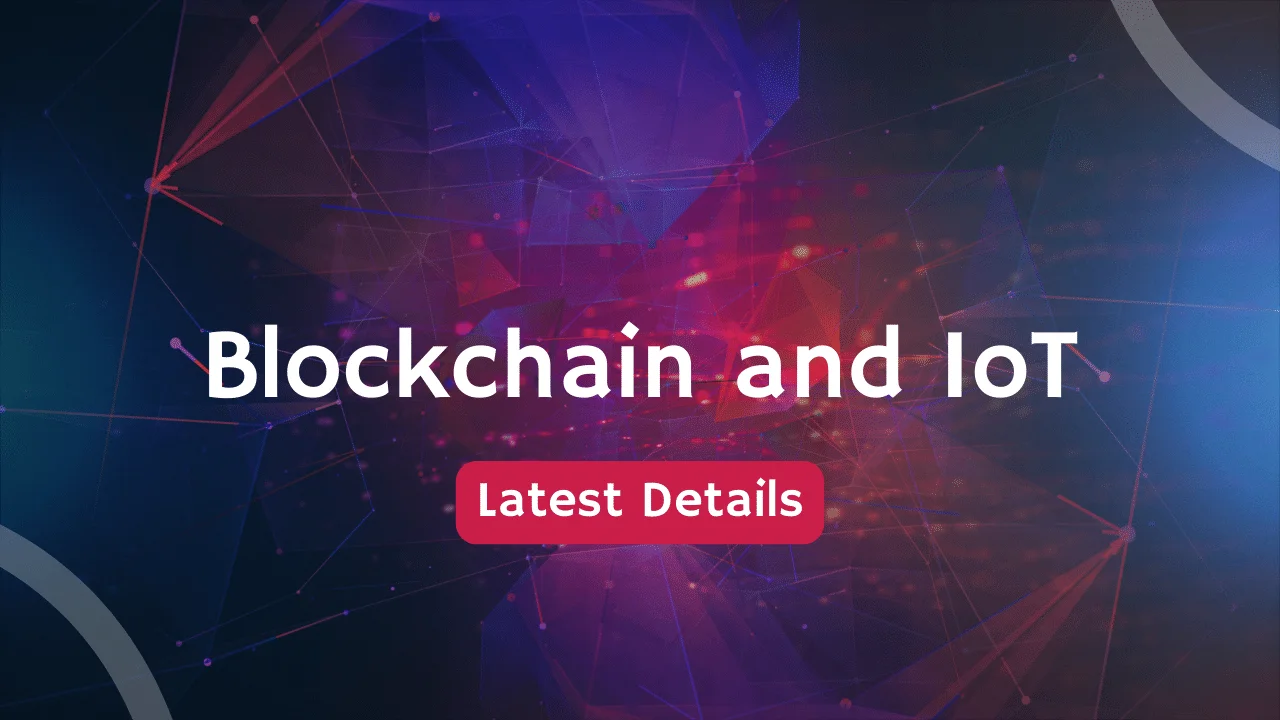Blockchain technology’s incorporation into the IoT heralds a new era of groundbreaking technological progress by providing solutions to the network’s inherent privacy, security, and compatibility issues. This integration, commonly known as Blockchain and IoT, incorporates blockchain’s distinct features, such as decentralisation, transparency, and immutability. It could significantly transform the way billions of devices communicate and transact in industries as varied as healthcare and supply chain management. In the end, we hope that by shedding light on how Blockchain and IoT interact, we can build a more reliable, secure, and efficient digital world.
Understanding Blockchain and IoT Integration
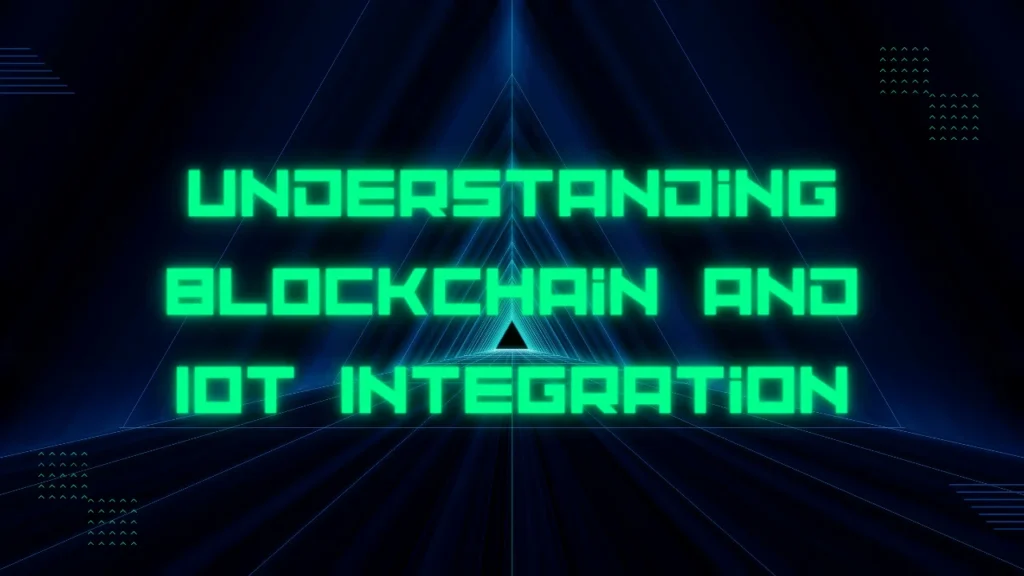
Necessity for Enhanced IoT Security
Everything from smart homes to intelligent transportation systems is becoming interconnected as the Internet of Things (IoT) grows at a dizzying rate. Nevertheless, increased security vulnerabilities accompany this proliferation. In the face of increasingly complex cyber threats, traditional security measures frequently fail to adequately safeguard IoT devices. The decentralised security model provided by blockchain technology allows it to tackle these concerns. Blockchain provides an impenetrable barrier against data breaches and cyberattacks because its immutable ledger makes it impossible to change or manipulate recorded data.
Operational Efficiency with Smart Contracts
One of the main components of blockchain’s connection to the Internet of Things is smart contracts, which are agreements that can execute themselves according to the terms written into code. With their help, devices can communicate with one another automatically, cutting down on operational costs and increasing efficiency. In a supply chain, for example, a smart contract could reduce or eliminate the need for human verification by automatically releasing payments upon shipment delivery confirmation by Internet of Things (IoT) sensors.
Supply Chain Transparency
Supply chain management is one area that can greatly benefit from blockchain technology because of its capacity to generate an unchangeable and transparent record of transactions. It guarantees the quality and authenticity of goods by allowing real-time tracking of their journey from production to delivery. By providing a verifiable and immutable record of the product’s history, this degree of openness fosters confidence among stakeholders and customers.
Addressing IoT Privacy Concerns
The Internet of Things (IoT) raises serious privacy concerns due to the massive amounts of personal data collected by devices in this space. One way blockchain technology can improve privacy is by empowering individuals to manage their own data. Users can mitigate the privacy risks associated with centralised data storage through the use of encryption and secure, decentralised storage. They can also choose who has access to their information.
Interoperability Among IoT Devices
Assuring smooth communication and interoperability among a wide variety of devices and platforms is a big challenge in the Internet of Things ecosystem. To facilitate safe and efficient data exchange, blockchain technology can act as a common language for all Internet of Things (IoT) devices. The full potential of the Internet of Things (IoT) can only be realised through interoperability, which enables more complex and integrated applications across various industries.
Challenges and Future Prospects
There are challenges to overcome, such as blockchain’s scalability problems and the high energy consumption of its consensus mechanisms, despite the promising synergy between blockchain and IoT. In order to accommodate the exponential expansion of IoT devices, future advancements will centre on developing blockchain solutions that use less energy and scalable architectures.
Innovative Applications Transforming Industries
The integration of blockchain technology with the Internet of Things is not merely an idea; it is being put into practice in various industries. Improving treatment accuracy and patient privacy, blockchain-enabled IoT devices in healthcare can securely transmit patient data to healthcare providers. This integration is used by smart cities to improve urban living conditions by enhancing public services through intelligent automation and real-time data analysis.
Real-Time Data Processing and Analysis
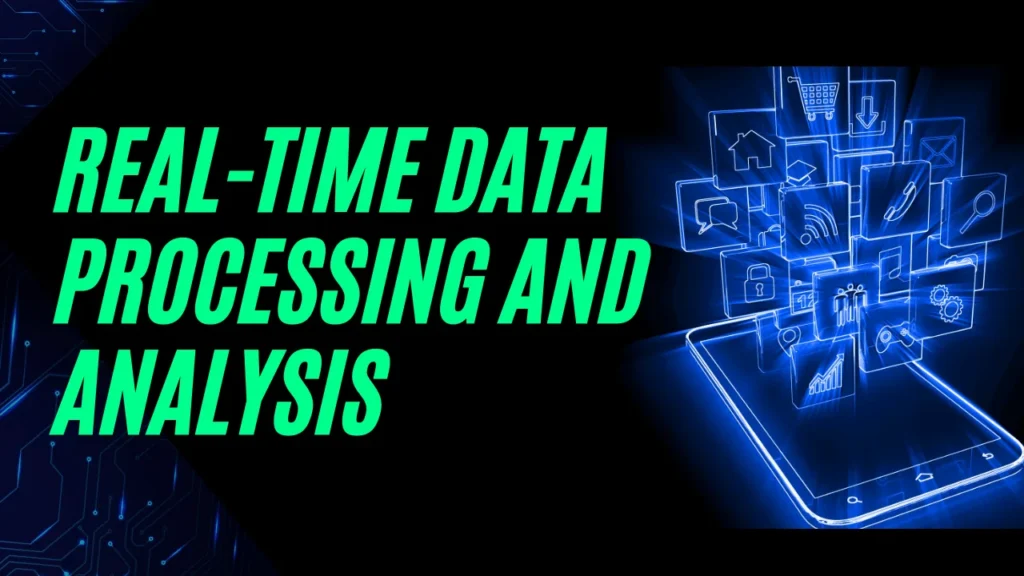
Data Integration Across Devices
Massive amounts of data are produced by the Internet of Things (IoT) due to the proliferation of connected devices. With blockchain technology, all of this data can be easily integrated, and it can be shared securely and reliably across all platforms and devices. In order for businesses and consumers to make better use of immediate data insights, this integration is vital for analytics and real-time decision-making.
Data Accuracy with Immutable Records
The immutable ledger of blockchain is crucial for improving the precision of data generated by the Internet of Things. The data utilised for analytics and decision-making is trustworthy and unaltered because it is securely recorded on a blockchain, which preserves the information’s integrity.
Optimizing Operational Decisions
Better, more timely operational decisions are possible with the integration of blockchain’s immutable and transparent ledger with real-time data processing. Supply chain agility, efficiency, and cost reduction can all take a major leap forward in industries like logistics and manufacturing as a result of this.
Automated Compliance and Reporting
By automating data capture and storage in a way that meets regulatory requirements, blockchain and the internet of things (IoT) streamline reporting and compliance procedures. Automating these processes not only makes compliance with regulations easier for businesses, but it also reduces the workload and the likelihood of human error.
Predictive Maintenance and Monitoring
Predictive maintenance of infrastructure and devices is made possible by utilising data from the Internet of Things on a blockchain. Devices can be made to last longer and be more reliable by looking for patterns and trends in data and fixing them before they cause system failures.
Blockchain IoT Applications in Industry
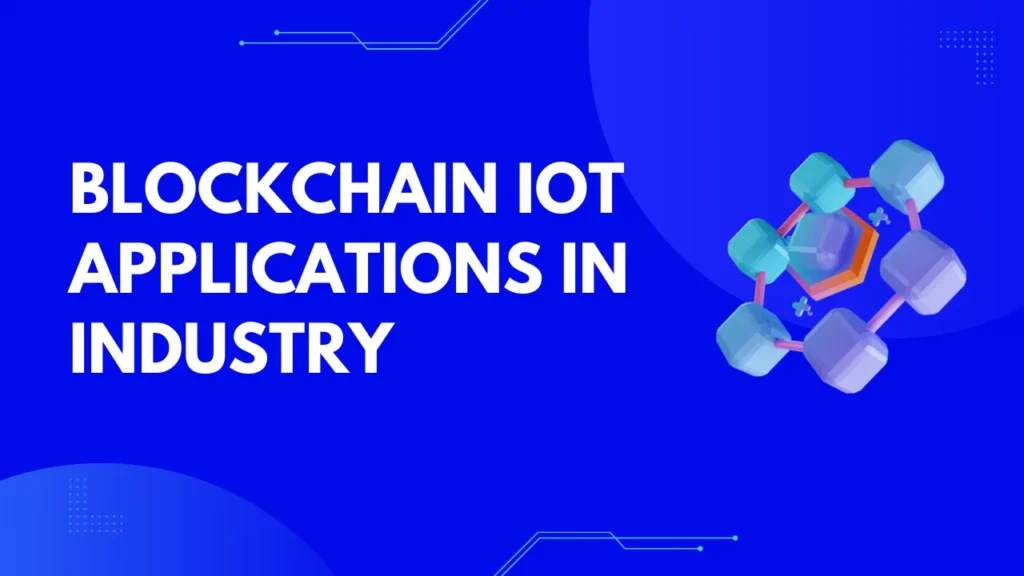
Revolutionizing Supply Chain Management
Thanks to the Internet of Things (IoT) and blockchain technology, supply chain management is undergoing a sea change. There can be less fraud, more genuine products, and more trust from customers if the whole supply chain can be tracked and verified from production to delivery.
Healthcare Solutions
Blockchain technology, when combined with the Internet of Things (IoT), can improve healthcare by securing patient data, allowing for remote patient monitoring, and streamlining medication traceability. By working together, these technologies do double duty: they encrypt sensitive data and pave the way for more efficient and individualised healthcare.
Smart Energy Grids
To maximise efficiency in power consumption and distribution, smart grids use blockchain technology and the Internet of Things. These grids can guarantee a steady supply of energy, decrease waste, and promote sustainable energy use by precisely monitoring and controlling the flow of energy.
Smart Cities
The Internet of Things (IoT) and blockchain technology allow smart cities to improve urban services including intelligent traffic management, waste management, and public safety systems. Urban areas can be developed more efficiently and sustainably with this integration, which improves the quality of life for residents.
Agricultural Innovation
Due to blockchain’s and the Internet of Things’ (IoT) ability to facilitate secure transactions, supply chain transparency, and accurate farm monitoring, the agricultural sector is undergoing a revolution. From the farm to the table, this convergence of technologies raises efficiency, decreases waste, and guarantees food safety.
Challenges in Scaling Blockchain for IoT Applications
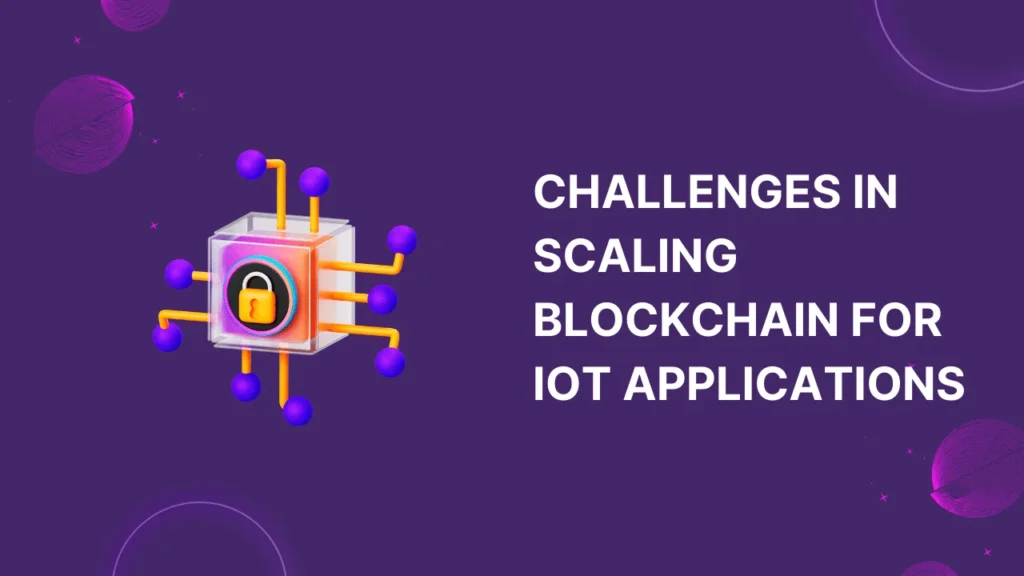
Network Scalability
Scaling blockchain networks to support the ever-increasing number of Internet of Things devices is a major obstacle. To tackle these scalability problems, researchers are investigating blockchain innovations like sharding and layer 2 solutions.
Environmental Concerns
There is a lot of worry about the effects of blockchain on the environment, particularly with systems that use proof-of-work consensus mechanisms. Consensus mechanisms that are better suited to the Internet of Things (IoT) and use less energy, such as proof-of-stake, are the focus of current research and development efforts.
Interoperability Between Diverse Systems
To facilitate frictionless data exchange and communication across the wide variety of IoT devices and blockchain platforms, interoperability must be guaranteed. In order to make devices work together more efficiently and to promote interoperability, standards and protocols are being developed.
Data Privacy and Security
Integrating blockchain with IoT devices raises new privacy concerns, even though it improves data security. Innovative solutions like zero-knowledge proofs and secure multi-party computation are needed to strike a balance between the transparency of blockchain and the need for data privacy.
Future of Blockchain and IoT Integration
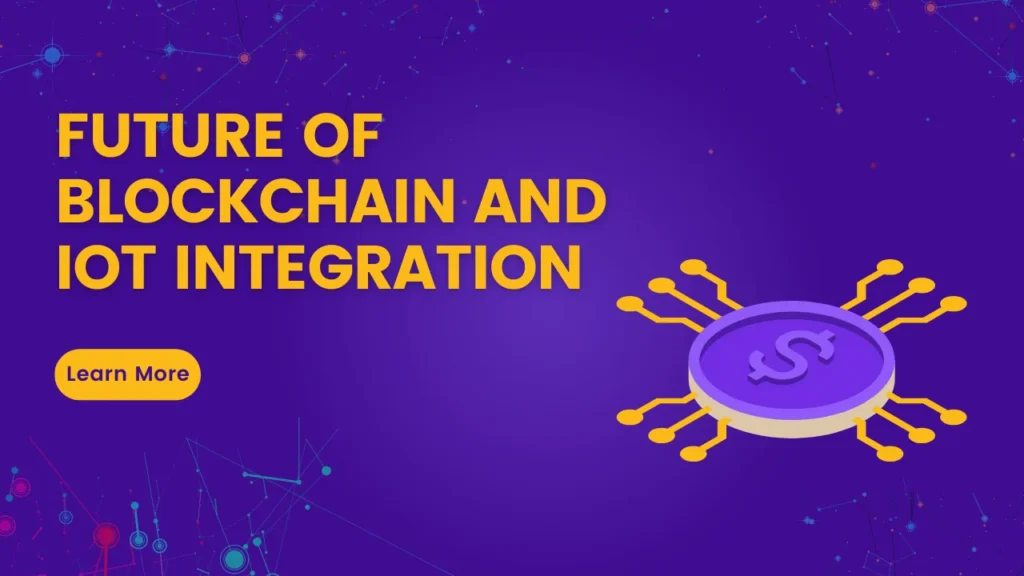
It is becoming more apparent that the convergence of blockchain technology with the Internet of Things (IoT) could revolutionise entire industries by providing new, cutting-edge answers to old problems in a safe and efficient manner. Both technical progress and regulatory frameworks that ensure the responsible and secure application of these technologies are necessary for the future. A more interconnected and secure digital world is possible with ongoing investment and collaboration across sectors, which bodes well for the future of blockchain and IoT integration.
FAQs
What are the security benefits of using blockchain in IoT devices?
By eliminating potential weak points and providing immutable records, blockchain technology improves the security of the Internet of Things (IoT).
How can blockchain technology solve IoT privacy issues?
Blockchain technology allows users to store data encryptedly and control who can access their data, which increases privacy and decreases the likelihood of data breaches.
What role do smart contracts play in IoT ecosystems?
Without the need for governing bodies, smart contracts automate transactions and autonomously enforce agreements between devices, leading to cost reduction and operational efficiency improvements.
Can blockchain technology improve the scalability of IoT networks?
There are a lot of IoT devices out there, and blockchain technology isn’t always scalable. However, new solutions like sharding and sidechains are on the way.
What are the energy consumption concerns with blockchain and IoT?
Energy is a scarce resource when running blockchain operations, especially those involving consensus mechanisms based on proof-of-work. Aims are being made to address this matter by creating consensus algorithms that use less energy.
Conclusion
Integrating blockchain technology with the Internet of Things (IoT) is a new field that shows excellent potential for addressing the privacy, security, and interoperability issues plaguing the IoT. Despite ongoing difficulties, advancements in both technologies are paving the way for a more secure, efficient, and interconnected digital future. As a cornerstone of our technological advancement, Blockchain and IoT together have the potential to shake up entire industries and create new opportunities for application development.

Timothy Jensen is an expert writer who specializes in the world of cryptocurrencies, including blockchain technology and Bitcoin. He has a passion for explaining complex topics in an easy-to-understand way. Timothy’s work aims to demystify the digital currency landscape for his readers.

